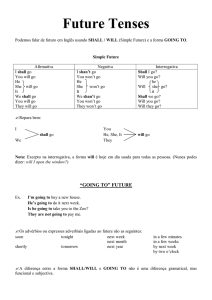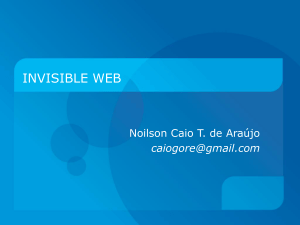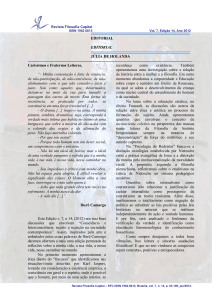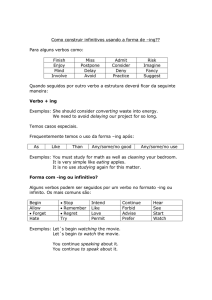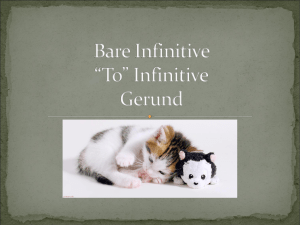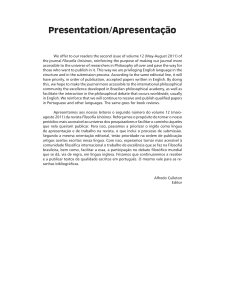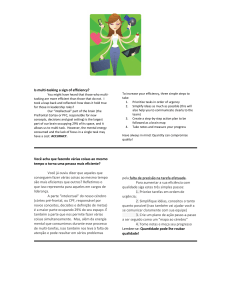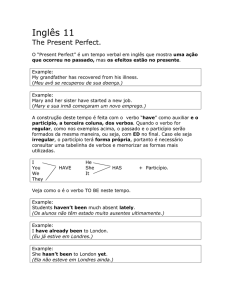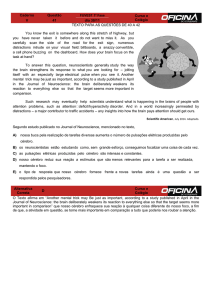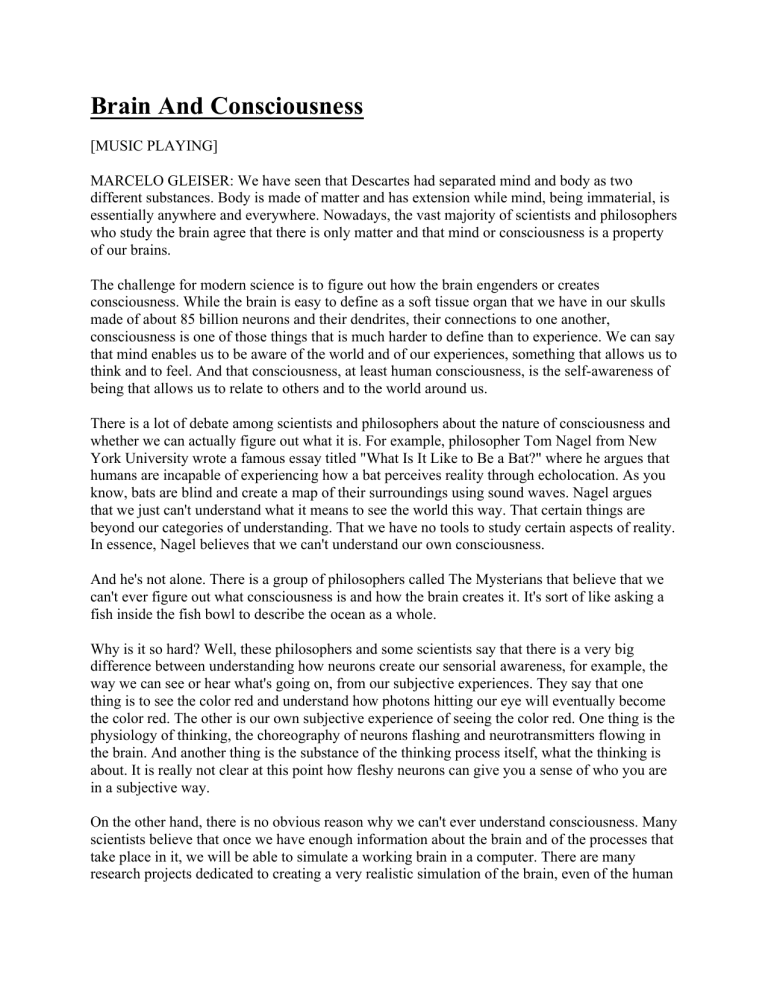
Brain And Consciousness
[MUSIC PLAYING]
MARCELO GLEISER: We have seen that Descartes had separated mind and body as two
different substances. Body is made of matter and has extension while mind, being immaterial, is
essentially anywhere and everywhere. Nowadays, the vast majority of scientists and philosophers
who study the brain agree that there is only matter and that mind or consciousness is a property
of our brains.
The challenge for modern science is to figure out how the brain engenders or creates
consciousness. While the brain is easy to define as a soft tissue organ that we have in our skulls
made of about 85 billion neurons and their dendrites, their connections to one another,
consciousness is one of those things that is much harder to define than to experience. We can say
that mind enables us to be aware of the world and of our experiences, something that allows us to
think and to feel. And that consciousness, at least human consciousness, is the self-awareness of
being that allows us to relate to others and to the world around us.
There is a lot of debate among scientists and philosophers about the nature of consciousness and
whether we can actually figure out what it is. For example, philosopher Tom Nagel from New
York University wrote a famous essay titled "What Is It Like to Be a Bat?" where he argues that
humans are incapable of experiencing how a bat perceives reality through echolocation. As you
know, bats are blind and create a map of their surroundings using sound waves. Nagel argues
that we just can't understand what it means to see the world this way. That certain things are
beyond our categories of understanding. That we have no tools to study certain aspects of reality.
In essence, Nagel believes that we can't understand our own consciousness.
And he's not alone. There is a group of philosophers called The Mysterians that believe that we
can't ever figure out what consciousness is and how the brain creates it. It's sort of like asking a
fish inside the fish bowl to describe the ocean as a whole.
Why is it so hard? Well, these philosophers and some scientists say that there is a very big
difference between understanding how neurons create our sensorial awareness, for example, the
way we can see or hear what's going on, from our subjective experiences. They say that one
thing is to see the color red and understand how photons hitting our eye will eventually become
the color red. The other is our own subjective experience of seeing the color red. One thing is the
physiology of thinking, the choreography of neurons flashing and neurotransmitters flowing in
the brain. And another thing is the substance of the thinking process itself, what the thinking is
about. It is really not clear at this point how fleshy neurons can give you a sense of who you are
in a subjective way.
On the other hand, there is no obvious reason why we can't ever understand consciousness. Many
scientists believe that once we have enough information about the brain and of the processes that
take place in it, we will be able to simulate a working brain in a computer. There are many
research projects dedicated to creating a very realistic simulation of the brain, even of the human
brain. The real believers think that we will eventually have enough information and computer
power to simulate a working brain and hence, human consciousness.
I think this optimism is healthy for advancing research but that it is philosophically naive. After
all, the complexity of the brain is so enormous that I find it very hard to believe that we will have
enough information about all the neurons, all their connections, and all the chemicals flowing
through them to put in a computer program.
Recall that our tools capture only a fraction of what's out there. The brain as an object of
scientific study is no exception. We may know a lot about it but never all of it. Furthermore, it's
also not clear how we can think of consciousness without relating to our bodies. After all, the
brain connects to every part of the body through our nervous system. And it's very difficult to
imagine a brain functioning on its own, what some call a brain in a vat, and how such a thing can
generate anything close to human consciousness. What seems more realistic is to imagine that
such simulations will create some kind of brain and some kind of consciousness, but not
anything close to our own minds.
To figure out our minds is what philosopher David Chalmers of New York University called the
hard problem of consciousness. To crack this problem, if it can be done, will surely call for very
new ways of thinking. We will have much more to say about this during the week.
[MUSIC PLAYING]
Cérebro e Consciência
[MÚSICA TOCANDO]
MARCELO GLEISER: Nós vimos que Descartes dividiu mente e corpo como duas substâncias
diferentes. O corpo é feito de matéria e tem extensão, enquanto a mente, sendo imaterial, está
essencialmente em qualquer lugar e em toda parte. Hoje em dia, a grande maioria de cientistas e
filósofos que estudam o cérebro concordam que há apenas matéria e que a mente ou a
consciência é uma propriedade de nossos cérebros.
O desafio para a ciência moderna é descobrir como o cérebro gera ou cria a consciência.
Enquanto o cérebro é fácil de definir como um órgão de tecido mole que temos em nossos
crânios, feitos de 85 bilhões de neurônios e seus dendritos, e suas conexões uns com outros, a
consciência é uma daquelas coisas que é muito mais difícil de definir do que de experimentar.
Podemos dizer que a mente nos permite ter consciência do mundo e de nossas experiências, algo
que nos permite pensar e sentir. E essa consciência, pelo menos a consciência humana, é a
autoconsciência de ser que nos permite relacionar com os outros e com o mundo à nossa volta.
Há muito debate entre os cientistas e filósofos sobre a natureza da consciência e sobre se
podemos realmente compreender o que ela é. Por exemplo, o filósofo Tom Nagel, da
Universidade de Nova Iorque escreveu um famoso ensaio intitulado "Como É Ser um Morcego?"
em que argumenta que os seres humanos são incapazes de experienciar como um morcego
percebe a realidade através da ecolocalização. Como você sabe, os morcegos são cegos e criam
um mapa de seus arredores usando ondas sonoras. Nagel argumenta que nós não conseguimos
entender o que significa ver o mundo dessa maneira. Que certas coisas estão além de nosos tipos
de compreensão. Que não temos ferramentas para estudar certos aspectos da realidade. Em
essência, Nagel acredita que não podemos compreender nossa própria consciência.
E ele não está sozinho. Há um grupo de filósofos chamados The Mysterians, que acredita que
não poderemos jamais descobrir o que a consciência é e como o cérebro a cria. É como pedir a
um peixe dentro do aquário para descobrir o oceano como um todo.
Por que é tão difícil? Bem, esses filósofos e alguns cientistas dizem que existe uma grande
diferença entre compreender como os neurônios criam nossa consciência sensorial, por exemplo,
a maneira como podemos ver ou ouvir o que está acontecendo, e nossas experiências subjetivas.
Eles dizem que uma coisa é ver a cor vermelha e entender como fótons atingindo seu olho
acabarão se tornando a cor vermelha. E outra coisa é nossa própria experiência subjetiva de ver a
cor vermelha. Uma coisa é a fisiologia do pensamento, a coreografia dos neurônios piscando e
dos neurotransmissores fluindo no cérebro. E outra coisa é a substância do processo de
pensamento em si, sobre o que é o pensamento. Não está realmente claro, neste momento, como
os neurônios carnudos podem lhe dar uma sensação de quem você é de uma maneira subjetiva.
Por
outro lado, não há razão óbvia para dizer que não poderemos nunca compreender a consciência.
Muitos cientistas acreditam que, uma vez que tenhamos informações suficientes sobre o cérebro
e os processos que ocorrem nele, Seremos capazes de simular um cérebro em funcionamento em
um computador. Há muitos projetos de pesquisa dedicados a criar uma simulação muito realista
do cérebro, mesmo do cérebro humano. Os que creem de verdade pensam que eventualmente
teremos informações suficientes e computadores potentes para simular um cérebro em
funcionamento e, portanto, a consciência humana.
Acho que esse otimismo é saudável para o avanço das pesquisas mas que é filosoficamente
ingênuo. Afinal, a complexidade do cérebro é tão enorme que eu acho muito difícil acreditar que
nós teremos informações suficientes sobre todos os neurônios, todas as suas conexões, e todos
produtos químicos que fluem por eles para colocar em um programa de computador.
Lembre se que nossas ferramentas capturam apenas uma fração do que está por aí. O cérebro
como objeto de estudo científico não é exceção. Podemos saber muito sobre ele, mas nunca tudo.
Além disso, também não está claro como podemos pensar na consciência sem relação com
nossos corpos. Afinal, o cérebro se conecta com todas as partes do corpo por meio do nosso
sistema nervoso. E é muito difícil imaginar um cérebro funcionando por conta própria, O que
alguns chamam de cérebro encubado, e como isso pode gerar algo próximo da consciência
humana. O que parece mais realista é imaginar que tais simulações criarão algum tipo de cérebro
e algum tipo de consciência, mas não alguma coisa próxima de de nossas próprias mentes.
Decifrar nossas mentes é o que o filósofo David Chalmers, da Universidade de Nova Iorque,
chamou de problema difícil da consciência. Resolver esse problema, se é que isso pode ser feito,
certamente exigirá maneiras muito novas de pensar. Teremos muito mais a dizer sobre isso
durante a semana.
[MÚSICA TOCANDO]



